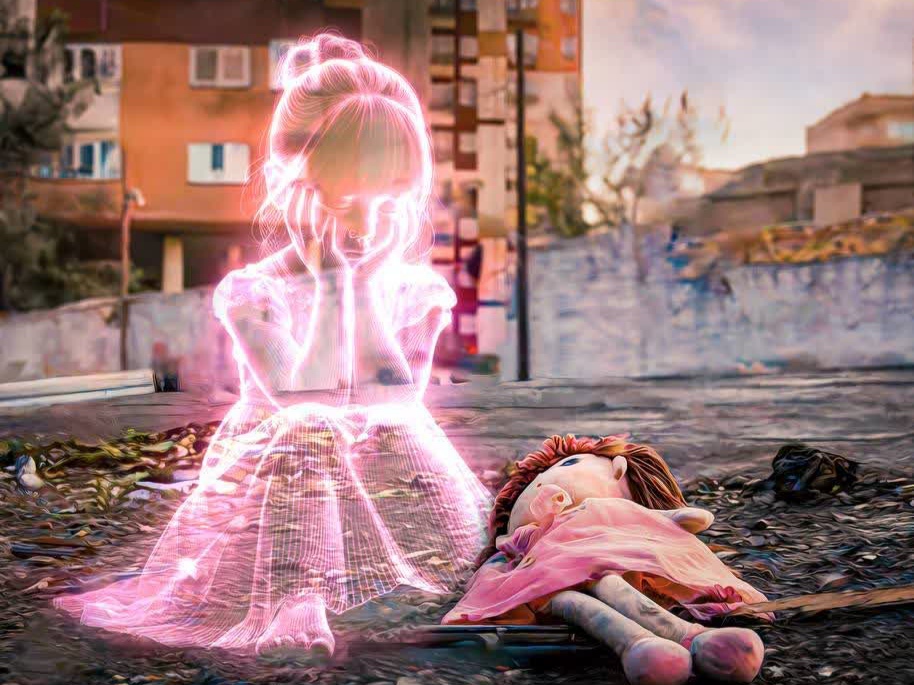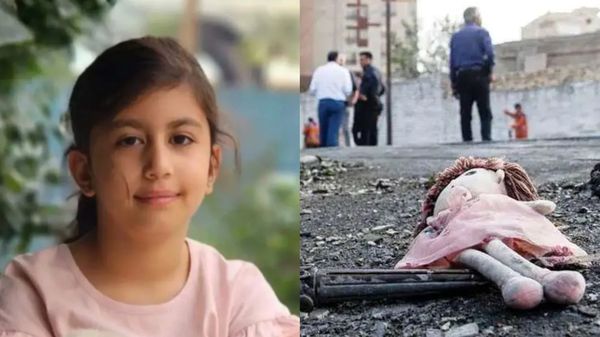Baran, the little girl who fell into eternal sleep amid war and fire, never let go of her doll. Now, in her memory, her mother Sāyeh holds on to what remains—trying to keep her daughter’s spirit alive through the ashes of loss.
The Doll Called Baran
That doll was Baran. The one lying on the ash-covered street that dark night, across the alley. The explosion had ruffled her hair and wounded her small body. Baran had named her “Sara” and hugged her tight every night before sleeping. That night, Sara was in her arms—but an Israeli missile hurled them both from the seventh floor.
A Family Gathering That Turned to Nightmare
It was Thursday night. Baran’s entire family was at her grandmother’s: aunts, their children, and her parents—Ehsan and Sāyeh. Late at night, Baran didn’t want to stop playing. Ehsan called every few minutes, urging them to go home. Each time she sweetly replied,
“Bābājon, just five more minutes. Five minutes!”
“Alright, Miss Baran, but remember you have swimming class tomorrow—be up early!”
“I promise, Papa… I’ll wake up earlier than anyone!”
Before dawn arrived, the explosion, fire, and missile struck. Baran woke first—and Israel took her fragile life. Around 1 AM they returned home. Their eyes still stinging when the house shattered with a deafening blast.
A Tale from the Rubble—What We Didn’t See
Sāyeh, Baran’s mother, is the only survivor, badly burned and hospitalized after several surgeries. She’s haunted by the scenes, reliving them minute by minute. Marzieh, Baran’s aunt, heard the day’s events once from Sāyeh—and recounts the story.
Ehsan and Sāyeh woke to a massive jolt and thunderous noise. They didn’t know what was happening as the ceiling rained down debris. When awareness returned, they found themselves against the elevator shaft, battered but alive. Only a narrow floor strip remained. Despite their broken bodies, Ehsan said:
“Baran, I’m coming to rescue you, don’t be afraid, Papa’s here.”
Following that sliver of floor, they moved rubble inch by inch toward Baran’s room. The bricks and stones felt like red-hot coals, searing anyone who touched them. Yet, despite hearing their flesh crack beneath the weight, they cleared the debris, calling out:
“My beautiful Baran, can you hear me? Daddy’s almost there, my strong girl…”
A Father Who Gave His Life to Save His Daughter
Their bodies were blistered by the time they reached the door. Flames from the lower floors crept upward. The narrow footing was perilous—one misstep would send them into a deep pit. In that pitch darkness, only love for Baran kept them moving.
Ehsan reached the door first, gasping for breath, his strength gone. He pushed it open. There was nothing—only a burn mark on the carpet remained. That tiny spark of hope he’d clung to vanished. His knees gave way. Foam spilled from his mouth as he collapsed and breathed his last in front of Sāyeh.
Sāyeh couldn’t understand—where was their daughter? Her husband died before her eyes; their home vanished; their daughter gone; her flesh burning like meat frying in oil. It felt like a terrifying nightmare. Rescue teams arrived, naming the horror: it was war—Israel had attacked.
The Doll Led Them to Baran
The aunts found out from the news. Images of the building circulated online. They spent the entire following day searching—hospital to hospital, alley to morgue. Maybe Baran had wandered off frightened, or been rescued, or lay nameless in a mortuary. But no trace was found of a little girl in pink clothes.
Sāyeh refused to let anyone stay by her side in the hospital. Despite her burns, she kept repeating:
“Find Baran… just find Baran.”
The aunts returned home, combing through ashes and cooled flames. Still nothing. A day passed like an eternity. Then, Sara—the doll—was found on the street corner, among ashes and glass shards, its hair singed by fire. Baran always held her tight—now that Sara was there, Baran must be nearby.

They discovered her under the rubble in the building garage—thrown from the seventh floor and buried beneath debris. They brought the news of her martyrdom to Sāyeh, along with Baran’s belongings: her pink pillow, pencils, books. They dusted them off so that at least some memento from their home could comfort her.
Distorting the Truth to Whitewash the Crime
In the days that followed, Israel’s cyber army tried to distort Baran’s and her family’s image—associating them with prominent public figures to mask the shame of killing a child. But the truth was clear: Baran and her family were just ordinary.
Ehsan, Baran’s father, was a simple bank employee. Sāyeh worked at Shahid Beheshti University. Baran, like any child, had many childish dreams. Whenever she saw her aunts, she’d excitedly raise her hand to show nine fingers:
“Auntie! I counted—only nine more years till I’m grown—then I’ll get my license, take Dad’s car to pick you up, let’s go out!”
She adored her father wholly. More than being attached to her mother, she relied on Ehsan. Whenever she was going out with him, she cheerily asked her mother:
“Mom, me and Dad are going shopping—want anything?”
Their father‑and‑daughter outings were frequent—now the father‑and‑daughter martyrs.
No Çake in This House
Since Baran left, her aunt Marzieh refused to let anyone make halva in the house. The last time she made it for charity, Baran, her mother, and father arrived unexpectedly. Baran tried a spoonful and her eyes sparkled:
“Auntie, do you promise you’ll never ever ever make halva when I’m not around?! I love your halva!”
Baran’s aunt made her a heartfelt vow — and to this day, she has never broken it.


